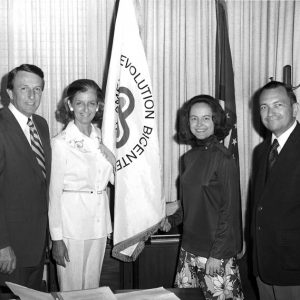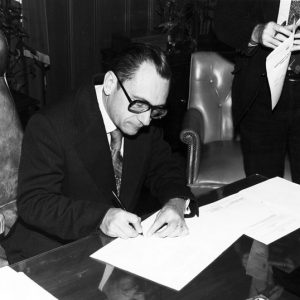calsfoundation@cals.org
John Lewis Ferguson (1926–2006)
John Lewis Ferguson—historian, minister, author, archival administer, and historic preservationist—served as Arkansas state historian and the director of the Arkansas State Archives (previous called the Arkansas History Commission) from 1960 to 2005, only the third person to hold that position since 1905. His forty-five-year tenure was the longest in the agency’s history.
John Ferguson was born on March 1, 1926, on a farm near Nashville (Howard County) to farmer and World War I veteran Clarence Walter Ferguson and his wife, Nannye N. McCrary Ferguson. As a child attending the rural York’s Chapel School, he read every history book he could find. Early on, he decided to pursue a career in history. He graduated from Nashville High School in 1944. In 1951, he was ordained as a Missionary Baptist minister. A year later, he earned a BA in history from Henderson State Teachers College (now Henderson State University), followed by an MA in history from the University of Arkansas (UA) in Fayetteville (Washington County) in 1952. In 1960, he received a PhD in history from Tulane University. During this time, he served as pastor of rural Arkansas Missionary Baptist churches in Howard and Yell counties.
Ferguson married Oris Brandon of Center Point (Howard County) in 1956. They had two children.
From 1952 to 1956, he headed the Department of Social Studies at Central Baptist College in Conway (Faulkner County). From 1958 until 1960, he taught history, first at Little Rock University (now the University of Arkansas at Little Rock), and then at Arkansas Polytechnic College (now Arkansas Tech University) in Russellville (Pope County).
In 1960, he began his long tenure as director of the Arkansas History Commission in Little Rock (Pulaski County). In 1968, working with preservation experts from Colonial Williamsburg, he began Arkansas’s first agency devoted to saving the state’s historic sites and buildings, the Arkansas Historic Preservation Program. Later, the agency transferred to the Department of Arkansas Heritage.
During the 1970s, he led a successful campaign to obtain new and larger facilities of his commission in the One Capitol Mall building on the grounds of the Arkansas State Capitol.
Following a reorganization of state government in 1971, his agency became a part of the history division of the Arkansas Department of Parks and Tourism, with Ferguson directing the history division of that agency. At the time, it included the Arkansas History Commission, the Old State House Museum, the Arkansas Territorial Restoration (now the Historic Arkansas Museum), and other similar agencies. In 1975, all of these agencies except the history commission became a part of the Department of Arkansas Heritage. The commission remained within the Department of Parks and Tourism with Ferguson as its director.
During the mid 1970s, he served as the chairman of the Arkansas American Revolution Bicentennial Committee, oversaw the work of the committee’s staff, supervised the distribution of grants, and played an active role in the state’s participation as a public speaker. He also played a leading role in the state’s Sesquicentennial Celebration in 1986, working closely with the groups from the public sector as well as local and state governments.
Ferguson, who had an encyclopedic knowledge of Arkansas history, oversaw the expansion of his agency’s budget from a little over $18,000 in 1960 to over a million dollars in 2005. His staff grew from only three in 1960 to over twenty when he retired. Under his direction, the commission’s holdings grew with substantial and significant additions to its collections of newspaper files, U.S. Census records, Arkansas county records, Civil War military service records, as well as thousands of books and other publications.
During his professional career, he authored several books on Arkansas history, including Arkansas and the Civil War (1965), Arkansas Lives (1965), and The Church Called County Line (2002). He also coauthored one of the state’s most popular Arkansas history textbooks, Historic Arkansas (1966).
Ferguson retired from the Arkansas History Commission on May 1, 2005. He died at his Little Rock home on March 25, 2006. He is buried in County Line Cemetery near his childhood home of Nashville.
For additional information:
John L. Ferguson Papers. Arkansas State Archives, Little Rock, Arkansas.
Woodworth, Hillary. “Ex-state historian Ferguson dead at 80.” Arkansas Democrat-Gazette. March 28, 2006, p. 2B.
Russell P. Baker
Arkansas History Commission and State Archives






Comments
No comments on this entry yet.